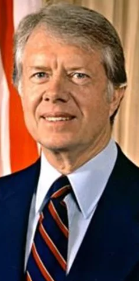March 17, 2023
Supreme Leader Ali Khamenehi says the United States decided to overthrow the Islamic Republic in December 1979, little more than 10 months after it took power.
In a speech January 9, Khamenehi cited two documents released several months ago by the State Department as part of its continuous process of publishing documents on foreign policy after they have been locked away for more than three decades.
Khamenehi said it was based on one of these documents, a December 1979 order, that Iraqi dictator Saddam Hussein invaded Iran nine months later on December 22, 1980. However, there is nothing in any of the hundreds of documents released that links the US to Saddam’s invasion. In fact, they indicate the Carter Administration was taken by surprise by Saddam’s invasion.
Furthermore, the order that Khamenehi cites authorized “propaganda and political and economic action” against the Islamic Republic, but does not authorize any military action.
Khamenehi said the order means that Carter directed the CIA “to overthrow the Islamic Republic.” The document does not say that. However, in very bureaucratic terminology, it orders the US government “to encourage interactions that could lead to a broad, pro-Western front capable of forming an alternative government”-in other words, regime change.
The first document is a record of a meeting of the Special Coordination Committee (Intelligence) (SCC(I)), a grouping of senior officials to review ongoing events and propose how to deal with revolutionary Iran. The document was undated, but, based on references in the document, the meeting was held between December 22 and 27, 1979.
Here is the full text of that document summarizing the meeting.
“The following discussion by the SCC(I) on December 20 was approved by the President. The SCC(I) considered a proposed new finding regarding intelligence operations regarding Iran. Discussion centered on the operative description of our objectives in contacts with groups opposing Khomeini’s regime. It was agreed, that these contacts were intended ‘to encourage interactions that could lead to a broad, pro-Western front capable of forming an alternative government.’ This wording was considered to be consistent with the decisions taken at the NSC [National Security Council] meeting the previous day. The DCI [director of central intelligence] noted that he needed a finding which would permit him to respond to the kinds of questions we are getting from [former Iranian Prime Minister Shahpour] Bakhtiar, viz: What does the U.S. think of General Oveissi? Should Bakhtiar link up with him or not? Is the Shah in contact with Oveissi? What does the U.S. think of General Ansari? Are we prepared to assist Bakhtiar in getting funding from the Saudis via Egypt? All agreed that the Congress would support a finding such as that proposed, although there was a risk that it would leak at some point. Dr. [National Security Adviser Zbigniew] Brzezinski noted that this group should be kept informed of any actual expenditures of funds and what they were intended for. The DCI will draft general guidance on the use of funds. [2 lines not declassified] Secretary [of State Cyrus] Vance pointed out that the finding represents a major step. It indicates that this group has made a decision to bring groups together to bring down Khomeini. Secretary [of Defense Harold] Brown pointed out that we are proposing to encourage actions which ‘could’ lead to an alternative government. Dr. Brzezinski said that this finding also had contingency value since Khomeini may fall and we will need to be able to support an alternative grouping. The SCC(I) unanimously recommended that the President approve and sign the attached finding.
“On December 21, the SCC agreed that together with the background and discussion of the issue as approved by the President, the finding provided the necessary authority to proceed with the necessary actions. All agreed that the finding did not indicate that we anticipated that Khomeini’s regime could be transformed into a ‘responsible and democratic regime.’ [2-1/2 lines not declassified]. The President’s approval of the notes would be important in dealing with the congressional committees.”
The attached second document was the official and formal “Presidential Finding,” dated December 27, 1979, and signed by President Carter.
The full text reads:
“I find the following operation in a foreign country is important to the national security of the United States, and direct the Director of Central Intelligence, or his designee, to report this finding to the concerned committees of the Congress pursuant to Section 662, and to provide such briefings as necessary.
SCOPE DESCRIPTION
“Conduct propaganda and political and economic action operations to encourage the establishment of a responsible and democratic regime in Iran; make contacts with Iranian opposition leaders and interested governments in order to encourage interactions that could lead to a broad, pro-Western front capable of forming an alternative government.”
A footnote points out that the original draft of the finding reads: “Conduct propaganda and political and economic action operations to support opposition to Khomeini’s radical regime.” Carter struck the text and wrote above it: “Conduct propaganda and political and economic operations to encourage the establishment of a responsible and democratic regime in Iran.”
The documents do indeed indicate that the Carter Administration shifted its focus in December 1979 to promote an alternative government. One problem with Khamenehi citing this is that the Islamic Republic has insisted for more than four decades that the United States was trying to overthrow the regime from the very beginning of the revolutionary regime, almost 10 months before this document was signed. But as other documents show, the US policy before December 1979 was to try to work with the Khomeini regime and establish good relations. This document changed that policy.
By citing this document, Khamenehi is acknowledging that the Islamic Republic spent almost its entire first year refusing to deal straightforwardly with the United States. That means acknowledging that it was the Islamic Republic that initiated the years of hostility and not the United States, as the regime has alleged.
